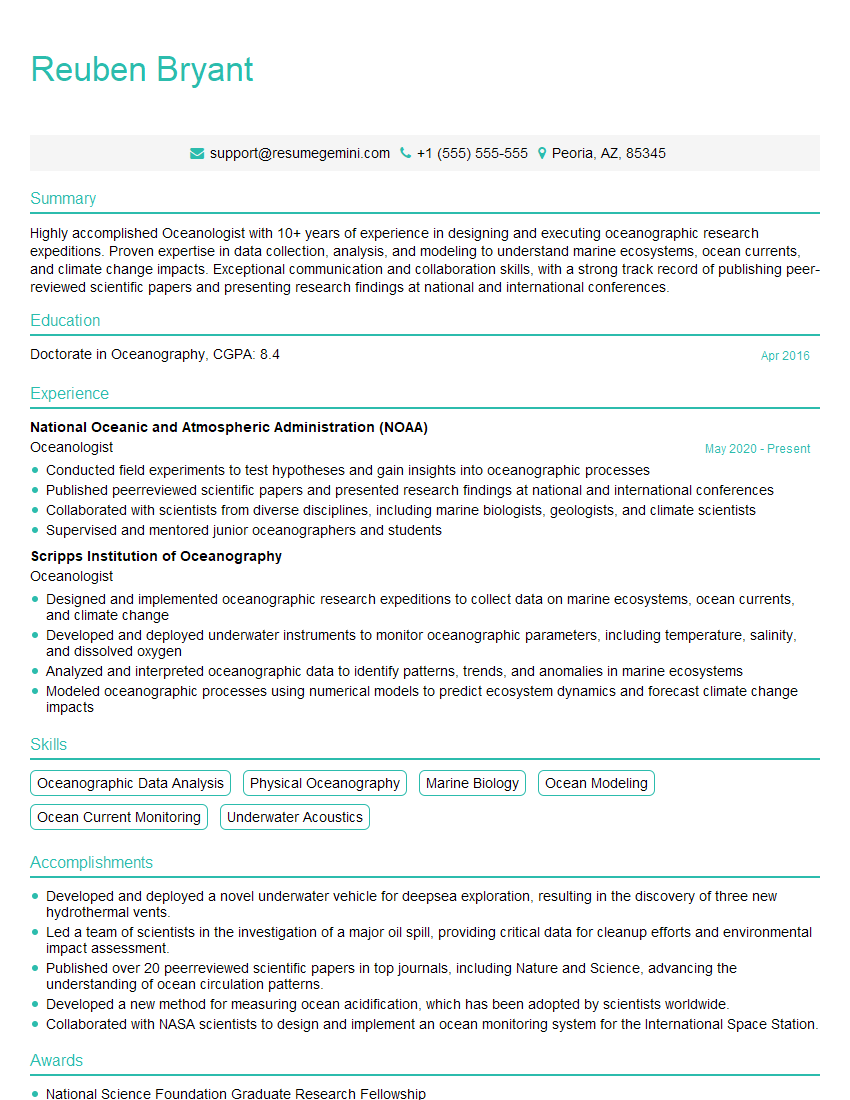Are you a seasoned Oceanologist seeking a new career path? Discover our professionally built Oceanologist Resume Template. This time-saving tool provides a solid foundation for your job search. Simply click “Edit Resume” to customize it with your unique experiences and achievements. Customize fonts and colors to match your personal style and increase your chances of landing your dream job. Explore more Resume Templates for additional options.

Reuben Bryant
Oceanologist
Summary
Highly accomplished Oceanologist with 10+ years of experience in designing and executing oceanographic research expeditions. Proven expertise in data collection, analysis, and modeling to understand marine ecosystems, ocean currents, and climate change impacts. Exceptional communication and collaboration skills, with a strong track record of publishing peer-reviewed scientific papers and presenting research findings at national and international conferences.
Education
Doctorate in Oceanography
April 2016
Skills
- Oceanographic Data Analysis
- Physical Oceanography
- Marine Biology
- Ocean Modeling
- Ocean Current Monitoring
- Underwater Acoustics
Work Experience
Oceanologist
- Conducted field experiments to test hypotheses and gain insights into oceanographic processes
- Published peerreviewed scientific papers and presented research findings at national and international conferences
- Collaborated with scientists from diverse disciplines, including marine biologists, geologists, and climate scientists
- Supervised and mentored junior oceanographers and students
Oceanologist
- Designed and implemented oceanographic research expeditions to collect data on marine ecosystems, ocean currents, and climate change
- Developed and deployed underwater instruments to monitor oceanographic parameters, including temperature, salinity, and dissolved oxygen
- Analyzed and interpreted oceanographic data to identify patterns, trends, and anomalies in marine ecosystems
- Modeled oceanographic processes using numerical models to predict ecosystem dynamics and forecast climate change impacts
Accomplishments
- Developed and deployed a novel underwater vehicle for deepsea exploration, resulting in the discovery of three new hydrothermal vents.
- Led a team of scientists in the investigation of a major oil spill, providing critical data for cleanup efforts and environmental impact assessment.
- Published over 20 peerreviewed scientific papers in top journals, including Nature and Science, advancing the understanding of ocean circulation patterns.
- Developed a new method for measuring ocean acidification, which has been adopted by scientists worldwide.
- Collaborated with NASA scientists to design and implement an ocean monitoring system for the International Space Station.
Awards
- National Science Foundation Graduate Research Fellowship
- American Geophysical Union Ocean Sciences Early Career Scientist Award
- Excellence in Oceanography Research Award from the Oceanography Society
- Coastal and Estuarine Research Federation Rising Star Award
Certificates
- Certified Oceanographer
- Scientific Diver Certification
- ROV Operator Certification
- AUV Operator Certification
Career Expert Tips:
- Select the ideal resume template to showcase your professional experience effectively.
- Master the art of resume writing to highlight your unique qualifications and achievements.
- Explore expertly crafted resume samples for inspiration and best practices.
- Build your best resume for free this new year with ResumeGemini. Enjoy exclusive discounts on ATS optimized resume templates.
How To Write Resume For Oceanologist
- Quantify your accomplishments with specific metrics and results.
- Highlight your expertise in relevant software and technologies.
- Demonstrate your passion for oceanography and research.
- Tailor your resume to each specific job you apply for, emphasizing the skills and experience most relevant to the position.
- Proofread your resume carefully for any errors.
Essential Experience Highlights for a Strong Oceanologist Resume
- Designed and implemented oceanographic research expeditions to collect data on marine ecosystems, ocean currents, and climate change.
- Developed and deployed underwater instruments to monitor oceanographic parameters, including temperature, salinity, and dissolved oxygen.
- Analyzed and interpreted oceanographic data to identify patterns, trends, and anomalies in marine ecosystems.
- Modeled oceanographic processes using numerical models to predict ecosystem dynamics and forecast climate change impacts.
- Conducted field experiments to test hypotheses and gain insights into oceanographic processes.
- Published peer-reviewed scientific papers and presented research findings at national and international conferences.
- Supervised and mentored junior oceanographers and students.
Frequently Asked Questions (FAQ’s) For Oceanologist
What is the role of an Oceanologist?
An Oceanologist studies the Earth’s oceans, including their physical, chemical, and biological characteristics. They conduct research on ocean currents, marine ecosystems, and climate change impacts.
What are the educational requirements to become an Oceanologist?
Most Oceanologists have a Doctorate in Oceanography or a related field, such as marine biology, geology, or physics.
What are the career prospects for Oceanologists?
Oceanologists can work in academia, government agencies, or private companies. They may conduct research, teach, or work in environmental consulting.
What are the key skills for Oceanologists?
Key skills for Oceanologists include data analysis, modeling, research design, and communication.
What are the challenges facing Oceanologists?
Oceanologists face challenges such as climate change, pollution, and overfishing. They work to understand these challenges and develop solutions to protect the oceans.
What are the rewards of being an Oceanologist?
The rewards of being an Oceanologist include the opportunity to make a difference in the world, to learn about the oceans, and to work with a team of dedicated professionals.